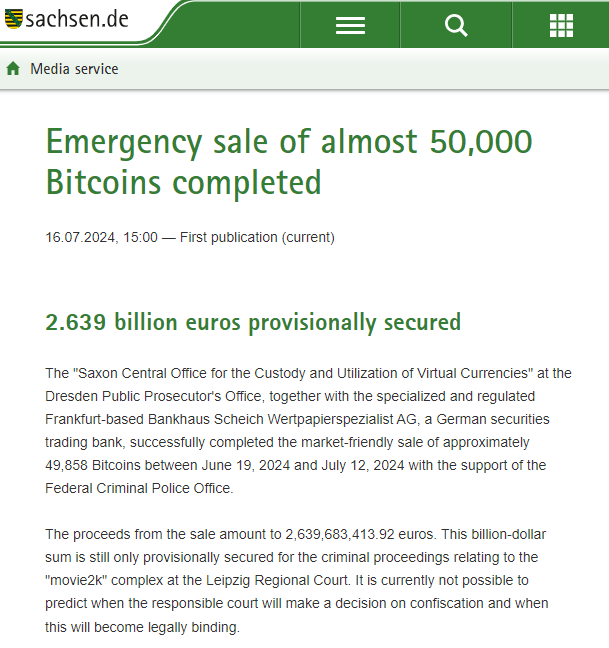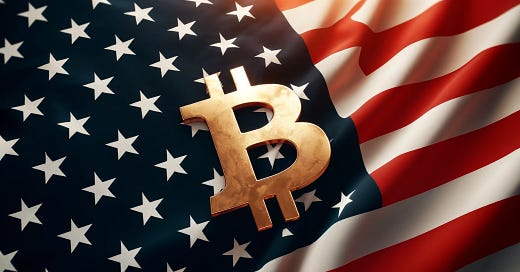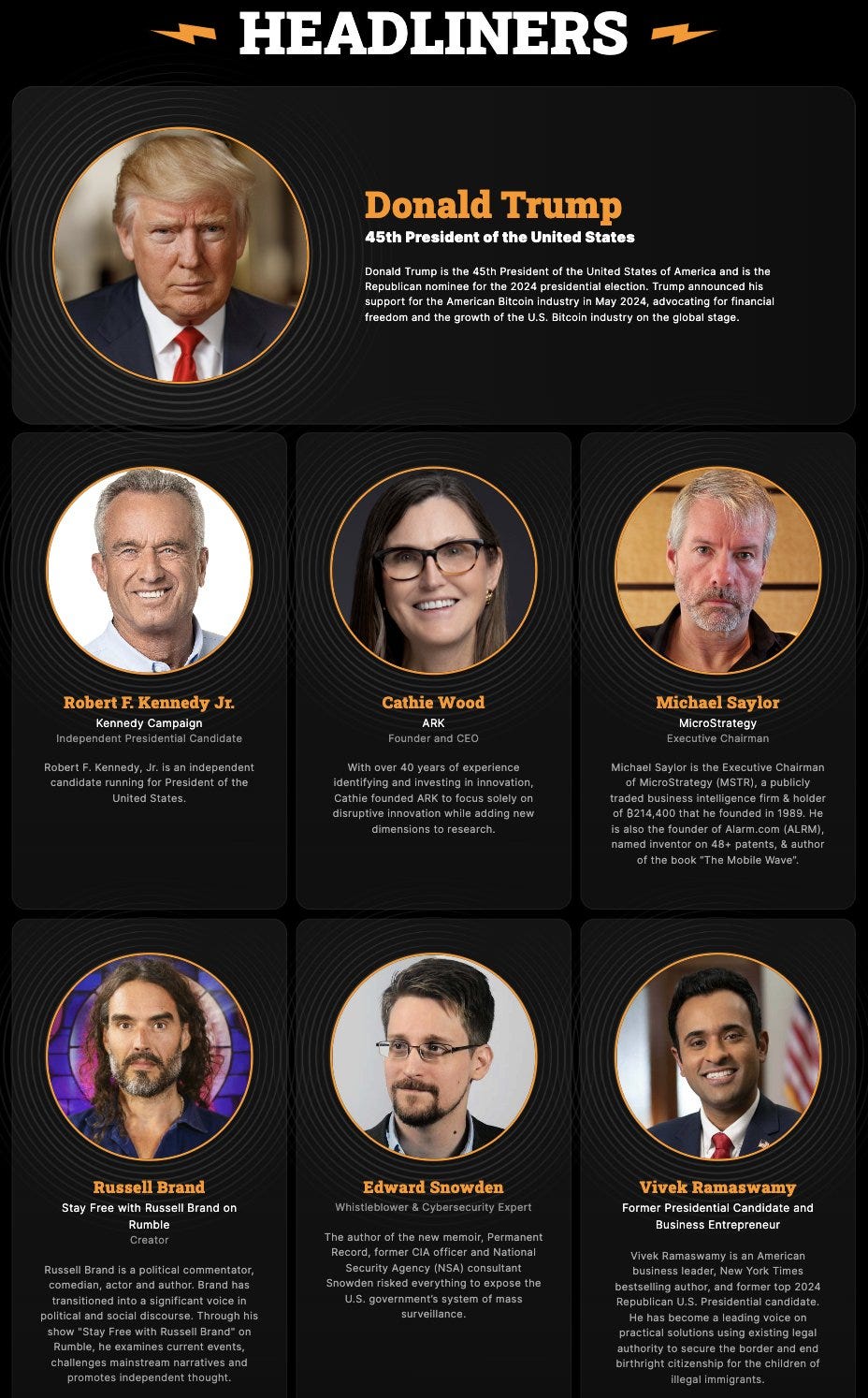How Bitcoin Ended Up on the Critical Path to the US Presidency
Two candidates for the US presidency just announced they would launch a strategic national Bitcoin reserve if elected
Bitcoin is simultaneously an asset, a network, a protocol, and an ideology.
Michael Saylor (Executive Chairman of MicroStrategy)
Last week, the annual Bitcoin Conference was held in Nashville, Tennessee. There, you could find the usual crowd of Bitcoin enthusiasts and businesses. But something was different this year. Two of the top three candidates for the US Presidential election were there, too: Donald J. Trump and Robert F. Kennedy Jr.
After 3.5 years of overt hostility towards the crypto industry, the Democrats have served the crypto constituency on a platter to the opposition. For years, the once all-powerful Securities and Exchange Commission (SEC) waged an unjust war against crypto businesses in America. After losing battle after battle in court, the SEC relented and approved Bitcoin ETFs, Ethereum ETFs, and dropped various lawsuits against the industry.
The misguided war on crypto was the brainchild of an unholy alliance between the far-left, led by US Senator Elizabeth Warren, and Wall Street, which did not look favorably at this parallel financial ecosystem being built without its approval. What Democrats failed to notice was that crypto was no longer some small fringe market, it had become a $2+ trillion market, with Bitcoin alone boasting a market capitalization of $1.3 trillion. It is hard to get reliable estimates, but there are between 52 million and 93 million crypto holders in the US. It’s a pretty big consistency to alienate.
Younger generations don’t hold a lot of stocks, bonds (it would be criminal to own any), or real estate. But they got a head start on crypto. When boomers and Wall Street dismissed it as a fad, Millennials started accumulating some crypto, and this crypto became very, very valuable. So, when the Biden administration kept attacking the crypto industry and hurting crypto prices in the process, it’s not hard to imagine why many crypto holders decided to look for political alternatives.
The newly anointed Democratic nominee, Kamala Harris, realized that alienating the crypto crowd was a losing strategy and is already showing signs of openness toward the industry, but it won’t be easy to make crypto holders forget the past 3.5 years of constant attacks against crypto. She even considered going to the Bitcoin Conference herself but decided against it. It was probably the right call, as she would have likely faced a very hostile audience.
This backlash generated by the Biden administration extends beyond the upcoming US presidential election. A group of congressmen and congresswomen sent a letter to the leadership of the Democrat Party urging it to change course on crypto.
Any Millenial crypto holder could have told them months ago what they put in the fourth paragraph:
From an electoral standpoint, crypto and blockchain technologies have an outsized impact in ensuring victories up and down the ballot. Crypto is at the top of voters' minds in swing states, and a balanced approach to crypto that spurs innovation while protecting consumers is a net positive for policymakers and candidates. Over 20% of voters in key battleground states identified crypto as a major issue for the 2024 election, and it is critical that our party presents a persuasive case to crypto voters while ensuring that consumers benefit from thoughtful and appropriate regulation.
When Donald J. Trump gave his speech at the Bitcoin Conference, he was surprised to see the room erupt when he said he would fire Gary Gensler, the Chairman of the SEC, on day 1. Not many audiences would cheer at the prospect of the removal of the head of a federal agency, but this particular audience was badly scarred. You can click on the video below to see the room's reaction.
So why does playing nice with the crypto crowd matter so much? Because many crypto holders are single-issue voters. They will decide who they will vote for solely based on what candidates say about crypto.
Beyond being a financial asset, Bitcoin is also a movement. By attacking Bitcoin and crypto, the Biden administration attacked an ideology and the wealth of the crypto community—not a good combination.
To understand Bitcoin holders better, I asked Claude, one of ChatGPT’s impressive competitors, to summarize their beliefs for me:
They believe Bitcoin is the future of money.
They see it as a way to escape government and bank control.
They value owning wealth directly, without intermediaries.
They trust Bitcoin's fixed supply to protect against inflation.
They appreciate being part of a global, censorship-resistant financial system.
They value the privacy and permissionless nature of transactions.
They view holding Bitcoin as supporting a fairer economic system.
They see themselves as part of a movement, not just as investors.
They believe Bitcoin promotes individual financial freedom.
They expect Bitcoin to reshape the future of finance.
Claude
Unsurprisingly, the two candidates who attended the conference made announcements designed to convince the Bitcoin community to vote for them.
Donald J. Trump
Will establish a strategic national Bitcoin stockpile, which will start with the current stock of about 210,000 BTC already owned by the US Government (1% of the BTC supply)
Will establish a Crypto Presidential Advisory Council
Will clarify the rules applicable to crypto in his first 100 days
Will end Operation Choke Point 2.0, which has been targeting crypto firms
Will fire Gary Gensler on Day 1
Will support US Dollar stablecoins
Will prevent the US Government from launching a Central Bank Digital Currency (CBDC)
Robert F. Kennedy Jr.
Will establish a strategic national Bitcoin stockpile, which will start with the current stock of about 210,000 BTC already owned by the US Government (1% of the BTC supply)
Will instruct the US Treasury to purchase 550 BTC daily until it has accumulated a reserve of 4 million BTC (19% of supply), equivalent to the percentage of global gold holdings owned by the US Government
The sale of Bitcoin for US dollar will be tax-free
Will ensure the right for US citizens to self-custody Bitcoin and run their own nodes
Will prevent the US Government from launching a Central Bank Digital Currency (CBDC)
Out of the two candidates, Robert F. Kennedy Jr. is the one who clearly did his homework and believes in Bitcoin. Donald J. Trump, while probably also vaguely convinced, has been more opportunistic and saw an opportunity to get the votes of a constituency that has been mistreated by the Biden administration.
The road to the White House is still long for the candidates, and many things can happen until then, but for the first time in a US presidential election, the candidates have to pay attention to crypto. Satoshi Nakamoto would be amazed by what his creation has become after just 15 years.
One More Thing
While Americans and American politicians have embraced Bitcoin and understand the role it may play in the future, the same cannot be said of Europeans. In a move reminiscent of its incoherent and misguided energy policy, Germany just sold 49,858 BTC it had previously seized for EUR 2.7 billion.
History may not be kind with the decision to sell a cryptographically scarce asset for a currency that the European Central Bank can print (and has printed) in unlimited quantities at no cost.

The 15-year-old asset is now the 9th largest asset in the world by market capitalization, but most people still haven’t done their homework and don’t understand it, which is why sovereigns and (most) investors are still severely underexposed to it, but the pivot has already started. With the summer break coming up, now may be a good time to get up to speed! Here is the list of books I recommended two summers ago. I will be back after the summer!










